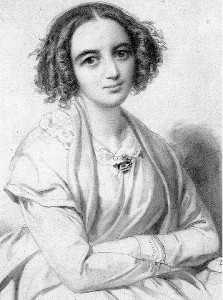SISTER MENDELSSOHN
1W: Fanny Mendelssohn Hensel
2M: pianist and cellist OR pianist and singer
“Dearest Fanny
Perhaps music will be Felix’s profession, whereas for you it can and must be an ornament, and never the fundamental bass line of your existence and activity. That is why ambition, and the desire to make the most of himself in circumstances he deems important, are forgivable, for he experiences it as a vocation. It is, however, no less to your credit that you have always shown your good heart and good sense at such moments, and the joy you manifest when Felix wins applause proves that you would have deserved it equally, had you been in his place. Persevere in these feelings and this attitude, for they are feminine and femininity alone is becoming in a woman.”
Excerpted from a letter to Fanny from her father
Did you know that Fanny Mendelssohn Hensel, eldest sister of Felix, wrote more than 400 works? Only half are yet in print. That she was considered an even greater pianist than her brother? Franz Liszt thought so. That her songs are more daring and interesting than those of brother Feiix? Charles Gounod thought so. That one of the most unjust letters in musical history was sent to her with love and respect from her father? This author thinks so—see the excerpt above.
Fanny and Felix Mendelssohn were two of the greatest musical wunderkinder the world has ever known. Despite the enormous constraints put on her by her own family, she managed to compose 400 works, and at age 40 finally had the temerity to have her work published. On the brink of familial and psychological freedom, ready to be a composer full-time, she died at the piano, preparing for a concert that very night. She was but 42 years of age.
One of the bittersweet joys of this work is that most all the music was written for family—cello music for brother Paulie, songs for sister Rebekka, and solo piano music for Felix and for herself.
Dearest Fanny, Only now we are beginning to understand: Music for you was never an ornament, never an avocation, never a feminine undertaking. With greatest respect, Your admiring public.
Music: Felix and Fanny Mendelssohn Hensel

